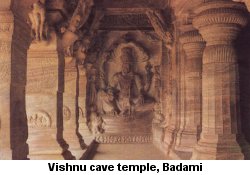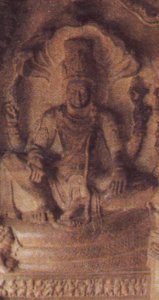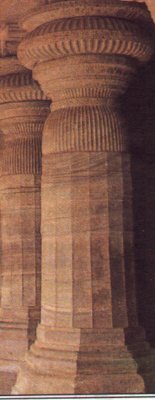STATES AND UNION TERRITORIES OF INDIA
KARNATAKA
Badami
Badami,
earlier known as Vatapi was the second capital of the Early Western Chalukyas
(120 kms from Bijapur and 46 kms from Aihole).
It is situated
at the mouth of a ravine between two rocky hills and is famous for its
rock cut cave temples as well as the Chalukyan style strucutal temples.
The cave temples
are situated adjacent to the Bhutanatha tank around which are found Nagamma,
Siva & Vishnu shrines.
The cave temples
are in 4 levels connected by a flight of stairs.
The lowermost
cave which can be reached by climbing around 40 steps is dedicated to Lord
Shiva It enshrins a siva lingam. Shiva as Nataraja is depicted with
eighteen arms in 81 dance poses (cosmic dance). Carvings of Ardhanareeswara
and Harihara, reliefs of Ganapati, Shanmukha and Mahishasuramardhini can
also be seen in this cave.
The second
cave reached by climbing 64 stairs from the first cave is dedicated to
Lord Vishnu. The Varaaha & Trivikrama & Krishna avatarams
of Lord Vishnu are depicted here. There are numerous carvings on
the ceiling of the cave. The carvings on the lintles display the
churning of the ocean to get amirtham & Lord Krishna's childhood.



The most interesting
is the 3rd cave which can be reached by climbing 60 steps from the second.
Numerous forms of Lord Vishnu are depicted here - Vishnu seated on a nagaa
(serpent), Narasimha (Vishnu as Man-Lion), Vishnu as Viraata purusha, Harihara
(Vishnu & Siva) and Trivikrama.
The topmost,
fourth cave temple is a Jain temple, with huge figures of the Jain Tirthankaras.
Several structural
temple in the Chalukyan style (a combination of the North & South
style) can be seen in the village. One of them is the Dattatreya
temple with fine sculptures.
The first examples
of the structural temples with vimana constructed by the Early Western
Chalukyas are the upeer Sivalaya, lower Sivaalya & Malegitti Sivalaya.
There is an
Archaeological Museum set up by the archaeological survey of India,
which displays sculptures, including the Lajja-Gauri images of fertility
cult, which flourished in the era.
|